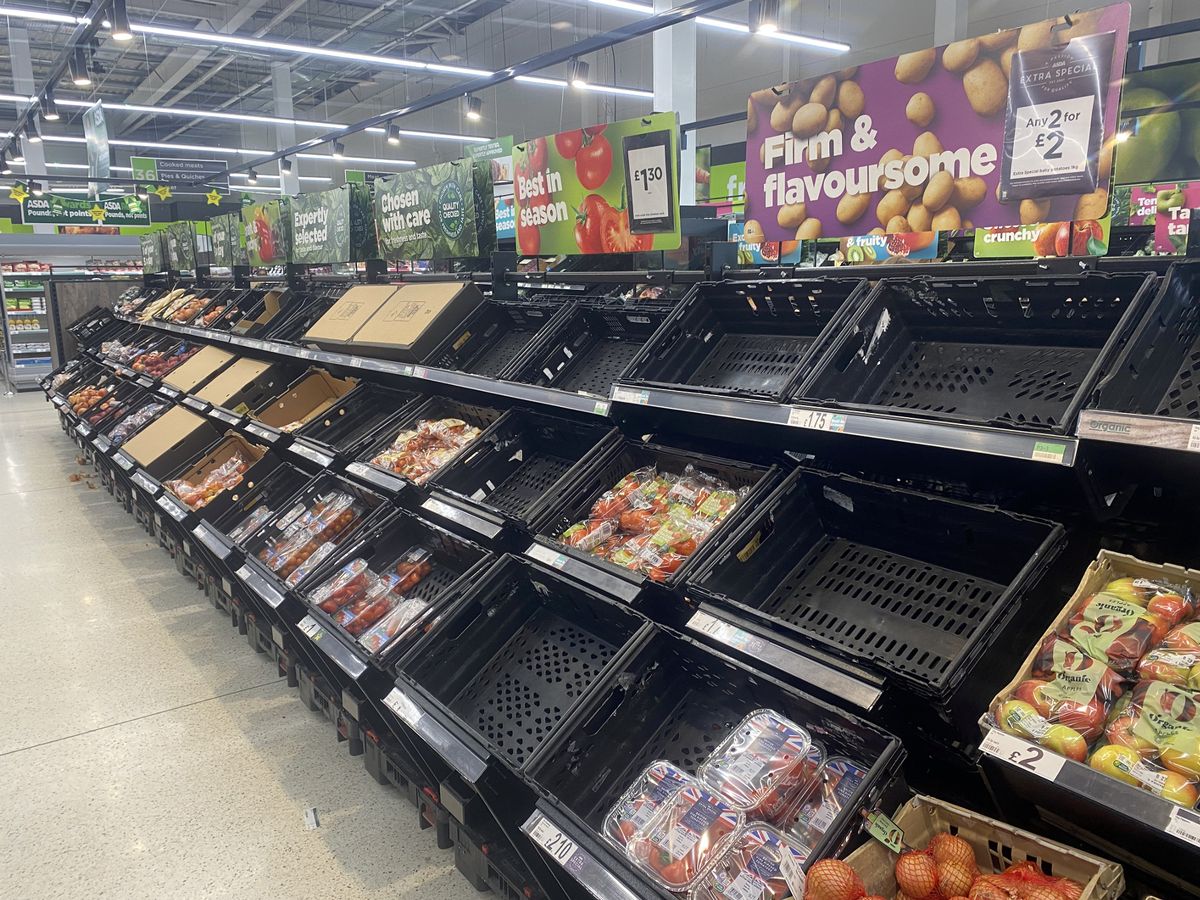UK supermarkets introduce buying limits as cooler weather and transport issues in Morocco and Spain reduce supply
British supermarkets have introduced rationing of some fruit and vegetables, after a cooler than usual winter in North Africa and southern Europe caused a shortage of tomatoes and other salad ingredients in the UK.
While tomatoes are grown in Britain during the summer months, the country relies on imports from Morocco and Spain during the winter.
In winter, the UK typically imports about 90 per cent of crops such as cucumbers and tomatoes. But it is nearly self-sufficient in summer.
The cooler weather this winter in Morocco and Spain has meant tomatoes are taking longer to grow, leading to empty shelves at British supermarkets.
Growers and suppliers in Morocco have had to contend with not only cold temperatures but also heavy rain, flooding, and cancelled ferries over the past three to four weeks.
Supplies from Britain’s other major winter source, Spain, have also been badly affected by weather. Tomato volumes from Spain’s Almeria region are 22 per cent lower than in February last year.
“Difficult weather conditions in the south of Europe and North Africa have disrupted harvest for some fruit and vegetables including tomatoes,” said Andrew Opie, director of food and sustainability at the British Retail Consortium, which represents major UK supermarkets.
:quality(70)/cloudfront-eu-central-1.images.arcpublishing.com/thenational/JX43I7CTFKXUNPW54SWMCH4ELQ.jpg)
British supermarket group Asda has imposed purchase limits on eight lines of fruit and vegetables due to “sourcing challenges” for products grown in southern Spain and North Africa.
Asda has introduced a three-pack limit for customers buying tomatoes, peppers, cucumbers, lettuce, salad bags, broccoli, cauliflower and raspberries.
“Like other supermarkets, we are experiencing sourcing challenges on some products that are grown in southern Spain and North Africa,” an Asda representative said.
“We have introduced a temporary limit of three of each product on a very small number of fruit and vegetable lines, so customers can pick up the products they are looking for.”
:quality(70)/cloudfront-eu-central-1.images.arcpublishing.com/thenational/SKV2ZFPLPQC5TXHZ36BJ7PUOXI.jpg)
In addition, the supermarket group Morrisons announced it will impose customer restrictions on the purchase of four salad vegetables from Wednesday.
Morrisons will introduce caps of two items per customer when buying tomatoes, cucumbers, lettuce and peppers, it said.
Dan Fulgoni, the managing director at Eurofrutta, a fruit and vegetable distributor at London’s New Covent Garden Market, is trying not to pass on the increase in price of imported tomatoes on to his customers.
“We are experiencing shortfalls in many products, including tomatoes,” he told The National.
“With regards to tomatoes we are just about managing to fill our demand but are having to pay a hefty premium for them, as demand outstrips supply.”
UK supermarket shoppers have become used to seeing empty shelves in recent years due to a variety of products and supply chain problems, ranging from panic-buying during pandemic lockdowns, Russia’s invasion of Ukraine and outbreaks of avian flu.
Energy costs
“This is just another just another issue in the continuing saga of supply chain issues really,” Jim Winship, director of both the British Sandwich Association and the Pizza, Pasta and Italian Food Association, told The National.
He added that greenhouse growers in the UK faced a huge rise in energy costs in the second half of last year.
“Back in late autumn of last year, growers were concerned that they wouldn’t be able to recoup the energy costs, so they didn’t put down the crops that they would normally do. So, combined with the weather conditions in places like Morocco, we’ve got significant shortages,” he said.
“And it’s not just tomatoes, it’s anything grown in greenhouses, basically.
“We’ve also got avian flu going on at the moment, and there are shortages of eggs and poultry meat. It just keeps rolling on, really, from one thing to the next.”
The head of the UK’s National Farmers Union said greenhouse growers should receive more help from the government in the face of soaring energy costs and that production was expected to fall to the lowest level since records began.
Horticulture is excluded from the government’s Energy and Trade Intensive Industries scheme that provides help with energy costs, while the country’s botanical gardens are included.
“The situation seems ridiculous,” NFU president Minette Batters told the union’s annual conference in Birmingham.
“The Royal Botanical Gardens, as important as they are, qualify for the scheme. But the protected crop sector ― those growing tomatoes, cucumbers, aubergines and peppers to feed British families ― don’t.”
But farming minister Mark Spencer said the current shortages had little to do with the challenges faced by UK producers.
“The reason we are short of those products in supermarket shelves today is because of weather events in other parts of the world,” he said.
Mr Fulgoni at Eurofrutta, which supplies catering businesses from restaurants to hotels and from schools to hospitals, says many products are being hit by supply chain problems at the moment.
:quality(70)/cloudfront-eu-central-1.images.arcpublishing.com/thenational/BXZCOLVQ47RJWIXF2SXOJYTCL4.jpg)
“The problem is much more widespread than just tomatoes,” he told The National.
“It is affecting a lot of produce — salads, peppers, cucumbers, onions, aubergines, courgette, broccoli and more. So, it’s going to be a bit of a roller coaster with regards availability on all those products for the next few weeks.”
However, producers and distributors agree that the current tomato shortage is just a blip and that British growers will be feeding into the market by late March and early April.
“We should start to see the tomato situation easing back again by April, because growers are putting down crops now,” Mr Winship told The National.
“I do not think this will still be an issue by late March,” Mr Fulgoni said.
“The weather should have improved by then, with other growers like the Dutch starting. I expect prices to remain high though.”
Meanwhile, James Bailey, executive director of upmarket supermarket Waitrose, told LBC radio that while supplies had been hit by extreme weather in Spain and in North Africa, the current tomato shortage was just a blip.
“Give it about a fortnight and the other growing seasons in other parts of the world will have caught up and we should be able to get that supply back in,” he said.
Earlier this month, Morocco barred the export of tomatoes, onions and potatoes to West African countries in an effort to reduce domestic prices and protect exports to Europe.
Source : The National News

















Add Comment